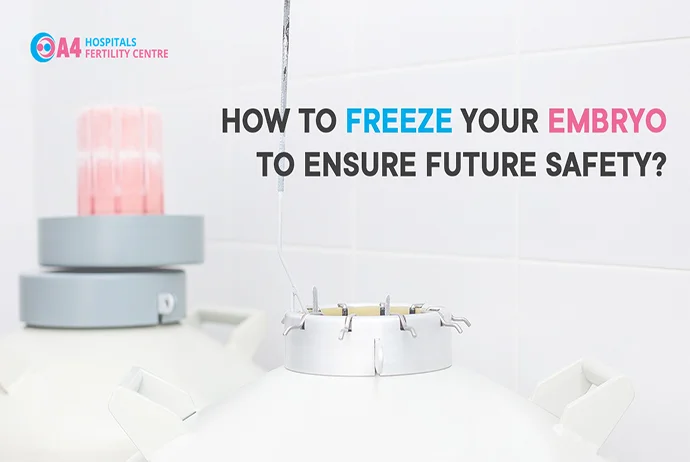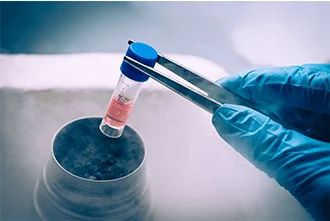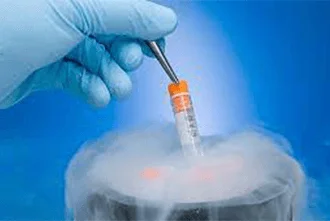
Dr. Aruna Ashok MBBS, MS OG, DNB OG
- Clinical Director

Embryo freezing is a technique that allows embryos to be stored for future use. Eggs that have not been fertilized can also be frozen. The embryo develops after fertilization and cell division. In the 1980s, the first successful pregnancy resulted from the freezing of a viable embryo. Since then, numerous individuals have frozen embryos for future use.


A person may choose to preserve an embryo if they intend to get pregnant in the future if they wish to donate it to others, if they wish to conduct medical research, or if they choose to use it for training purposes.
Initially, hormones and other drugs are administered to encourage the creation of possibly viable eggs. A physician then removes the eggs from the ovaries for laboratory fertilization or freezing.
Fertilization can result in at least one healthy embryo. A physician can then put the embryo into the uterus. If the treatment is successful, embryo development will occur.
But when you are considering freezing your/your partner's eggs, you might have many questions such as how long can an embryo be frozen as well as how long can embryos be frozen and still be viable and so on.
The medical profession uses the term embryo from the moment that cells proliferate following fertilization until the eighth week of pregnancy. Before embryo freezing may take place, appropriate embryos must be developed. To accomplish this in the laboratory, physicians must collect and fertilize eggs. First, the individual will take hormones to ensure that ovulation occurs on time. Then, they will take fertility drugs to enhance the number of eggs they generate. A doctor will retrieve the eggs at the hospital using an ultrasound machine to assure accuracy. An individual may want to freeze their eggs or they may prefer to utilize them immediately to conceive. In this situation, the consulting doctor may suggest in vitro fertilization (IVF) or intracytoplasmic sperm injection (ICSI).
During IVF : The doctor exposes the eggs to sperm and allows fertilization to occur in a laboratory. The correct phrase for a fertilized egg going forward is an embryo.
An embryologist will observe the development of the embryos for the next six days, at which point they will select an embryo for implantation.
During ICSI : The doctor removes the eggs and injects a single sperm into each egg. They may do this if there is a problem with the sperm or if previous IVF procedures were unsuccessful. The physician may utilize one embryo and freeze the rest.
In conclusion, both men and women are affected by the effect of climate change on infertility, which is a developing worry. While the environment might contribute to infertility, developments in science and medicine have given couples who are having trouble becoming pregnant hope. Don't be afraid to get in touch with us at A4 Fertility Centre for assistance and advice if you're having issues with your fertility.
Schedule a consultation with our fertility specialists, for a one-on-one conversation.
We will review your past and future fertility objectives.
You may be advised to undergo many tests including ultrasound for a comprehensive evaluation.
Depending on the circumstances, ovarian stimulation will begin on the half-day of menstruation or immediately. You will need to visit the clinic three to four times.
After around 10 to 12 days, we will perform the Oocyte collection or Egg retrieval surgery under general anesthesia. This is completely painless, and you will recover within hours.
Depending on your ovarian response to stimulation, we will attempt to retrieve many eggs to increase your future fertility.
All of the eggs will be Cryopreserved (frozen) in liquid Nitrogen until you decide to use them.
You can use them with the sperm of your future partner or an anonymous sperm donor if you want to become a single mother.
Under the capable direction of your consulting doctor, our highly competent and trained embryologists will cryo-preserve your eggs using an innovative technique called vitrification.
Vitrification is the most recent and effective method, which essentially eliminates the risk of ice crystal formation causing damage to the eggs, as was the case with the earlier slow-freeze procedure.
All of the eggs are put into a Cryo-container and stored securely in special tanks.
The A4 facility cryopreservation and storage facility includes only the strictest quality control checks, fault-resistant storage, alarm systems, remote monitoring 24 hours a day, seven days a week, and increased security. We guarantee that your eggs will be safe for as long as you desire.
Embryo thawing following cryopreservation has a pretty high success rate, and research indicates that women who use thawed embryos have a decent probability of having healthy children.
According to a 2016 comparative study and review, infants born after cryopreservation did not exhibit an increase in developmental problems. Despite this, the medical community requires additional long-term follow-up investigations.
Typically, normal activities can be resumed within a week post-egg retrieval. Avoid unprotected sexual activity to avoid unplanned pregnancy.
A fever over 101.5 F (38.6 C)
Extreme abdominal distress
More than 2 pounds (0.9 kg) of weight gain in 24 hours
Heavy vaginal bleeding
Problems urinating
In theory, a properly frozen embryo can remain viable indefinitely.
The embryos are stored in hermetically sealed containers at -321°F. Almost no biological processes, such as aging, can occur at this temperature.
There are documented instances of successful pregnancies resulting from eggs preserved for up to 10 years. There is no long-term study on embryo freezing because the process has only been performed by doctors since 1983.
Some nations control the length of time an individual may preserve embryos. Freezing and storing embryos are costly, and each clinic has its own policies about what happens if a person can no longer use or store frozen embryos.
If you are planning on freezing your embryos or want any clarification regarding this procedure please visit this link: https://www.a4fertility.com/